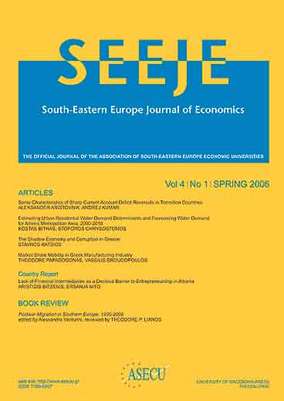Banking transformation 1980-2006 in central and Eastern Europe - from communism to capitalism
Part of : SEEJE ; Vol.7, No.2, 2009, pages 161-180
Issue:
Pages:
161-180
Author:
Abstract:
This article is a summary of the author’s recently published book “Banking in Central and Eastern Europe 1980-2006” and provides an overview of the history of banking transition from communism to capitalism in 14 Central and Eastern European countries (the former Soviet Union, Czechoslovakia, East Germany, Yugoslavia, Belarus, Bulgaria, Croatia, the Czech Republic, Hungary, Kazakhstan, Poland, Romania, the Russian Federation, Serbia and Montenegro, Slovakia, Ukraine and Uzbekistan). The essential functions of credit institutions in the former socialist economic system (monitoring and facilitation of plan fulfillment) are explained. The comprehensive collapse of the former system triggered a sustained weakening of the state structure. In most countries, the 1990s were a decade of major banking upheavals, turmoil and reform. The turn of the millennium featured sector consolidation, or was a culminating point of restructuring efforts. The first years of the new millennium have generally featured calmer, stronger and more open banking sectors than the 1990s. Two “banking reform waves” are distinguished, salient features of which all countries (need to) run through in order to mature. The first reform wave includes extensive liberalization measures and initial limited restructuring and tightening efforts. The macroeconomic situation temporarily stabilizes. But underlying distorted incentives favor the renewed accumulation of bad loans and set the stage for new banking crises. Only the second reform wave ushers in hard budget constraints, in-depth privatization and “real” owners (which are mostly — but not exclusively — foreign direct investors). Banking regulation and supervision improve substantially. Western European FDI has come to dominate banking in all former socialist countries that have either already become members of the EU or are candidates or have been given an official “perspective” to (eventually) join the Union. Recently, dynamic catching-up processes have gathered momentum in many countries. Against the background of strong economic recovery and expansion, credit booms have unfolded, not without considerable risks.
Subject:
Subject (LC):
Keywords:
banking crisis, banking reform, banking transformation, central and eastern Europe, credit boom, FDI, privatization, restructuring, soft budget constraints
Notes:
Περιέχει σημειώσεις, πίνακες και βιβλιογραφία, JEL classification: G21, G28, P34




